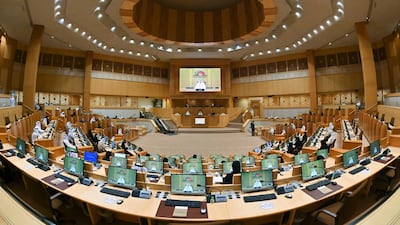The UAE's education minister will be urged to raise the salaries of Emirati academics at federal universities or risk losing them from the profession.
Dr Sheikha Obaid Al Tunaiji, a former professor of education and leadership at UAE University, will tell the Federal National Council on Tuesday that faculty members are being tempted by lucrative offers outside of the education sector.
Dr Al Tunaiji, who was elected to the council to represent Fujairah last year, said the morale of staff has been affected as calls for greater financial rewards go unheeded.
“An instructor’s job is very demanding. Teaching is only a small fraction of it, they also have to research and provide academic consultation,” she said before the council’s session on Tuesday.
Dr Al Tunaiji has sent a question to Hussain Al Hammadi, Minister of Education, asking if plans remain in place to boost pay.
A recommendation for such an increase was raised by FNC members in 2016 to the Cabinet.
“It was approved by the Cabinet and was sent back to the FNC in 2018 and until this day, no changes have been made," said Dr Al Tunaiji.
“So this has affected the instructors' motivation, waiting for it every day in vain, while watching their colleagues move to better offers outside the teaching sphere."
Speaking from experience, she said salaries at public universities were not enough.
At one of the universities, tuition fees are covered for only three children, she said, while the typical Emirati family has, on average, six children.
“This will discourage instructors from having more than three children, while the country needs to increase the [Emirati] population," she claimed.
“Most professors finish their PhD studies abroad, so when they return they need to enrol their children in private schools, and the fees are very high.
“The job is very challenging and requires a lot of preparation, and research requires a lot of reading and time and effort to be published in high-ranking journals.”
Professors therefore need to feel financially at ease to remain motivated for the job, she said.
When Dr Al tunaiji resigned from her teaching job at UAEU after she was selected as an FNC member, she said she promised her colleagues that this issue would be the subject of her first question raised to a minister at the council.
“As they bid me farewell, they asked me to raise this issue on their behalf.”
The minister is expected to answer the question personally, or by sending a written answer.
The FNC member has the right to accept the answer, or to summon the minister to a future session to debate the issue further.


